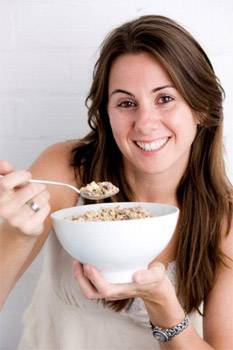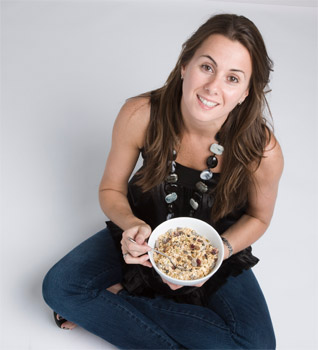Narelle Plapp's Top Tips For A Healthy Breakfast Interview

Narelle Plapp's Top Tips For A Healthy Breakfast Interview
Many people skip breakfast due to their busy lives and a lack of time in the mornings. However according to experts, breakfast is integral for both mental and physical health. In fact, people who eat breakfast actually eat fewer calories throughout the entire day, however this does depend on what is eaten and how healthy it really is.
Narelle Plapp, Naturopath and founder of one of Australia's leading muesli brands Food for Health, is passionate about breakfast and believes that skipping breakfast results in weight gain and an increased risk of diabetes. That being said, in order to get the most out of breakfast there a few things to keep in mind. Below Narelle has provided her top tips for a healthy breakfast:
Eat breakfast like a king
Have you heard of the saying 'eat breakfast like a king, lunch like a prince and dinner like a pauper?" People are more likely to maintain their weight and have a better functioning digestive system if they eat this way. Breakfast should include a balance between healthy fats, protein, carbs, fibre and little refined sugar.
Breaking the fast
A larger breakfast takes time to prepare, but remember that breakfast is 'breaking the fast" so you should give your body the fuel it deserves and yourself the time to prepare. Getting out of bed a little earlier will make all the difference with eating a healthy, wholesome breakfast.
Drinking water
Drink a glass of warm water with a squeeze of lemon or lime 30 minutes before you eat which will get your gut enzymes active. Gut enzymes (digestive enzymes) break down our food into nutrients so that our bodies can absorb them.
Protein
Eat protein! Protein keeps you fuller for longer. Foods that are high in protein and great with breakfast are eggs, Greek yoghurt, cottage cheese, milk, bacon, salmon, nuts and some grains including quinoa, to name a few.
Preparation is the key
Be prepared. Always have a fridge full of healthy options. My fridge always has: eggs, smoked salmon, avocado, milk, full fat yoghurt and berries. My cupboard always has: rolled oats, Food for Health seed boosters, quinoa, Food for Health fruit free clusters and fibre cleanse Muesli.
By understanding the concept of a good breakfast and its benefits, people will see what works for their body and what doesn't and change their meal accordingly. As long as you eat breakfast, you're already one step ahead.
For more information, please visit www.foodforhealth.com.au
Interview with Narelle Plapp
Question: Can you talk us through the disadvantages associated with skipping breakfast?
Narelle Plapp: Breakfast equals breaking the fast! Breakfast should be a biggest meal of the day and should include a good combination of protein, carbohydrates and little sugar.
By skipping breakfast your metabolism slows down as does your blood sugar levels. You can feel lethargic, dehydrated, get headaches, dizzy spells and halitosis.
 Question: Why is it vital children eat breakfast, every day?
Question: Why is it vital children eat breakfast, every day? Narelle Plapp: Like adults, children need good food to fuel their body and minds to prepare them for their day ahead. If we want productive, attentive children then we need to feed them. We also need them to get into the habit of eating breakfast. We need to make sure that they stay clear of sugary cereals, as this will only give them a short burst of energy. Feed them nutrient loaded smoothies, boiled egg on toast, or fruit free cereals.
Question: How does breakfast aid in both mental and physical health?
Narelle Plapp: Physically it aids in weight loss, balances blood sugar levels, speeds up metabolism and hydrates your skin. This all of course depends on what you are eating, so you need to make sure you drinking water, and eating a good combination of protein and carbohydrates.
Mentally, for those people who skip breakfast and especially children are essentially starting the day on an empty charge, which means the body then draws fuel and charge from energy reserves. Unfortunately the stress hormones that are activated in this process leave us feeling irritable, tired and unable to take in information quickly and efficiently.
Question: What do you suggest we have for breakfast?
Narelle Plapp: A good mix of protein, complex carbohydrates and be sure to stay hydrated with a decaffeinated herbal tea.
1: nutrient loaded smoothie:
in a base of milk, almond milk, or coconut water add banana, Food for Health high protein seed mix, rice bran syrup, shredded coconut, whey protein powder
2: poached eggs, accompanied with avocado and smoked salmon
3: Food for health fruit free clusters with Greek yoghurt topped with our high protein seeds.
Question: Can you talk us through the importance of a breakfast high in protein?
Narelle Plapp: Protein is essential for developing and maintaining lean muscle, but if we're not getting enough protein throughout the day, muscle maintenance is not at the maximal level. And when we finally get some protein at dinner, it's largely wasted because the body can only use so much at one time.
Use breakfast to pump up your protein. Include eggs, milk, high protein seeds like chia and teff and yoghurt, in your morning meal.
Another benefit of protein in the morning is that it's likely to keep you fuller longer so will stop your sugar levels from dropping and looking for a sweet snack to get you through until lunch time, so in turn helps keep you slim.
Question: What are digestive enzymes and how can we get them working?
Narelle Plapp: When we put food in our mouths, our digestive track starts the miraculous process of transforming that food into usable nutrients, uniting a combination of biochemical players whose job it is to carry out the task. Very importantly, the digestive enzymes play a substantial role in the digestive process, as the all-important 'cleavers" that turn big food molecules into smaller ones and allow us to absorb vital nutrients that our bodies need to function properly. Without these enzymes, much can go wrong. So if our digestive enzymes are not working at 100% efficiency we can get symptoms such as nausea, bloating, flatulence, constipation. Eating healthy clean food regularly should keep your digestive enzymes working.
Question: Do you believe we should be taking digestive enzymes as a supplement?
Narelle Plapp: I definitely believe there is a place for them. Obviously depends on whether or not people have allergies or food intolerances. Digestive enzymes are also used to treat autoimmune conditions such as arthritis. So yes, every case is different but they are a useful treatment in my opinion.
Question: Can you tell us about your breakfast products, Food for Health?
Narelle Plapp: I definitely believe there is a place for them. Obviously depends on whether or not people have allergies or food intolerances. Digestive enzymes are also used to treat autoimmune conditions such as arthritis. So yes, every case is different but they are a useful treatment in my opinion.
Interview by Brooke Hunter
MORE





